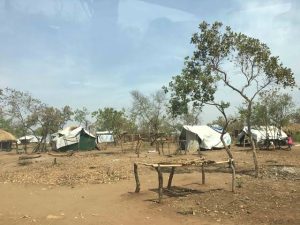PM Johnson promises friendly visas plan post-Brexit
3 min read
London, United Kingdom | AFP | Prime Minister Boris Johnson told African leaders Monday that Britain would be more open to migrants from their continent after Brexit as he hosted a summit intended to boost trading ties.
He also promised an end to direct UK state investment in thermal coal mining or coal power plants overseas, saying London would focus on supporting a switch to low-carbon energy sources.
Opening the first UK-Africa Investment Summit in London, Johnson made a clear pitch for business less than two weeks before Britain leaves the European Union.
He told the conference involving 16 national leaders and representatives of another five countries, he wanted to make Britain their “investment partner of choice”.
After highlighting all Britain has to offer, he said Brexit would mean an end to preferential treatment for EU migrants.
“Our (immigration) system is becoming fairer and more equal between all our global friends and partners, treating people the same, wherever they come from,” he said.
“By putting people before passports we will be able to attract the best talent from around the world, wherever they may be.”
Johnson met with the presidents of Nigeria, Rwanda, Ghana and Uganda at the summit, and was due to hold talks with the leaders of Egypt and Kenya on Tuesday.
Nigeria’s Muhammadu Buhari said Brexit offered an opportunity for increased free trade across the Commonwealth — and highlighted visas as a key issue.
“While many in the African diaspora enjoy considerable benefits from life in the West, they do not always feel at the heart of the community,” he wrote in The Times newspaper on Monday.
“A renewed sense that there are ties that bind us through the Commonwealth, and a concerted effort to grow those links through trade, could act as a spur to encourage togetherness and the certainty of belonging.”
– Breathe the same air –
The prime minister also announced a shift in investment strategy to help combat global warming, ahead of Glasgow staging the next UN climate change summit later this year.
“There’s no point in the UK reducing the amount of coal we burn, if we then trundle over to Africa and line our pockets by encouraging African states to use more of it, is there?” he said.
“We all breathe the same air, we live beneath the same sky. We all suffer when carbon emissions rise and the planet warms.”
He added: “Not another penny of UK taxpayers money will be directly invested in digging up coal or burning it for electricity.
“Instead, we’re going to focus on supporting the transition to lower and zero carbon alternatives.”
Campaign group Greenpeace UK welcomed the announcement, although it said Britain could do more.
“It’s great that in the middle of a climate emergency the UK government is finally putting a stop to taxpayers’ money being used to support coal plants and mines abroad,” executive director John Sauven said.
“But if Britain wants to lead by example, it should also urgently phase out support for oil and gas developments, which are pushing the world closer to climate chaos.”
Sub-Saharan African faces a number of environmental challenges, particularly the effects of climate change, water and air pollution, desertification, deforestation and over-fishing.
– Increase ‘risk appetite’ –
The government’s export agency reports providing £2 billion ($2.6 billion) in financing for British company exports to Africa in the past two years.
The agency says it now wants to “increase its risk appetite” in Egypt and the emerging economies in Nigeria and Rwanda.
British and African firms announced 27 commercial deals worth £6.5 billion ( ) at the summit, from energy provision in Cote D’Ivoire to road projects in Ghana and breweries in Kenya.
Britain will leave the EU on January 31, although ties will remain the same for 11 months while the two sides thrash out a new trading relationship.
London wants to leave the bloc’s single market and customs union to allow it to strike trade deals with other countries, even if this brings new barriers to EU trade.





